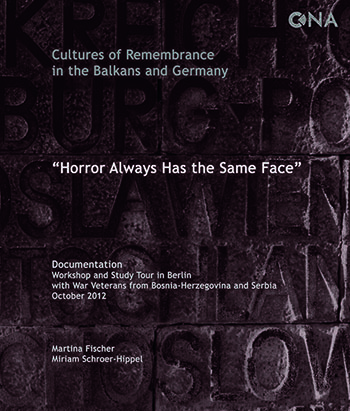![]() download complete report in pdf
download complete report in pdf
Introduction
War-torn societies face a crucial question and challenge: How to find words, gestures, sites, and forms of commemoration that explain the past in an appropriate manner and give guidance for building a shared future without repeating the pain? Peace practitioners and scholars are convinced that there is a need to face the legacies of the violent past to pave the way for peaceful co-existence, trust- and relationship building. At the same time, public presentation of history is often a source of conflict. Different interests and perspectives are involved and need to be addressed. To discuss these questions, the Centre for Nonviolent Action (CNA, Belgrade/Sarajevo) conducted a study tour to Berlin (Germany) with war veterans from the region of former Yugoslavia from October 15th-21st, 2012.
Eleven ex-combatants from Bosnia-Herzegovina and Serbia travelled to Berlin. All of them waged war in Bosnia in the 1990s and fought against each other on opposing sides. These former enemies are now promoting peace. Working under the most difficult conditions, they visit sites of atrocities in local communities in Bosnia and initiate discussions with inhabitants and authorities. Many places in Bosnia are still unmarked and others are marked by monuments that raise controversy. The group aims to convince and sensitise their fellow-citizens that the sites have to be marked in a way that creates empathy for the suffering of the victims of all sides.
(For more information on the activities of the war veterans and CNA see www.nenasilje.org and www.berghof-conflictresearch.org/documents/publications/daytone_fischerm_cna.pdf)
The aim of the tour to Berlin was to explore how Germany has dealt with its past and whether this can inspire the reconciliation process in the Balkans. The group visited memorial sites selected by the CNA-team during an earlier visit in March 2012: They included the “Memorial to the Murdered Jews of Europe”, the “Topography of Terror”, which is a memorial to the planning hub of the Nazi police institutions and former prison in the centre of Berlin, the memorial site of the former GDR-Prison “Gedenkstätte Hohenschönhausen”, the memorial and museum of the former concentration camp and war prison “Sachsenhausen”, and the Brandenburg Police School in the same neighbourhood. The visit also included talks with civil society initiatives for documenting local and oral history (Berliner Geschichtswerkstatt) and artistic forms of remembering exclusion, persecution, and deportation of the Jewish inhabitants of Berlin (established i.e. in the former Jewish quarter “Spandauer Vorstadt” and in the so-called “Bavarian Quarter”). (For a complete overview see http://nenasilje.org/en/2012/the-heritage-of-national-socialism-the-culture-of-remembrance-in-berlin/).
In addition to the study tour, the participants met for a workshop hosted by the Berghof Foundation on October 18th, 2012. The event offered space for deepening discussion with German experts, friends and supporters of CNA’s activities, and for reflecting on impressions from the visits to the memorials. The event was chaired by Martina Fischer (Berghof Foundation) and Nenad Vukosavljević (CNA). Two inputs informed the debate: Daniel Gaede, Director of the Educational Department at the Buchenwald Memorial Foundation, presented examples from the many German histories after 1945: Who became active in “remembrance policy” and how did these actors engage? What were the conditions for success? He highlighted the potential and limits of action on diverse (personal, social and state) levels and showed that dealing with the past is not a linear process. Adnan Hasanbegović and Nenad Vukosavljević presented the Centre for Nonviolent Action’s approach and how it supports ex-combatants’ efforts to achieve an inclusive culture of remembrance. War veterans explained their personal motivations and discussed their impressions from Berlin with friends and supporters of CNA and staff members of the Berghof Foundation. The German Ministry for Development and Co-Operation (BMZ) financed the tour and the workshop.
